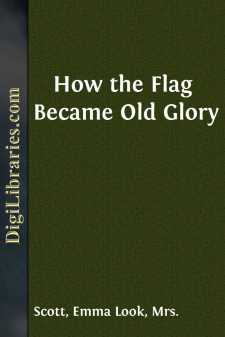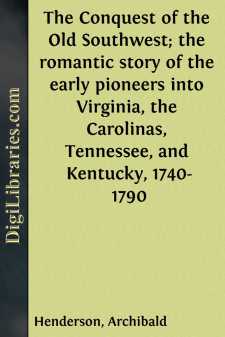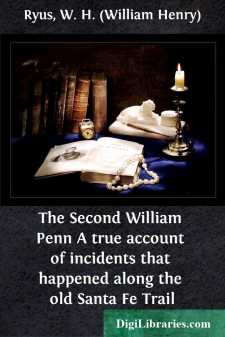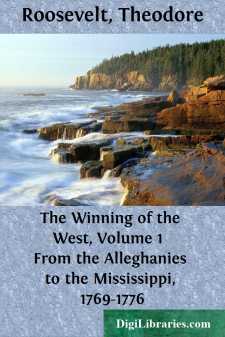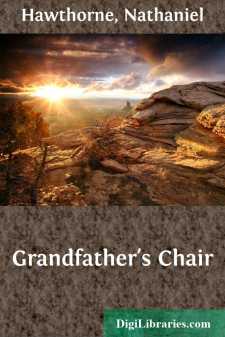History
- Africa 30
- Americas (North Central South West Indies) 50
- Ancient 68
- Asia 58
- Australia & New Zealand 8
- Canada 41
- Caribbean & West Indies 1
- Civilization 20
- Eastern Europe 12
- Europe 310
- Expeditions & Discoveries 60
- General 77
- Historical Geography 1
- Jewish 9
- Latin America 3
- Medieval 8
- Middle East 13
- Military 248
- Revolutionary 8
- Study & Teaching 5
- United States
- Western Europe 56
- World 13
United States Books
Sort by:
by:
Emma Look Scott
THE FLAG GOES BY HATS off!Along the street there comesA blare of bugles, a ruffle of drums,A flash of color beneath the sky;Hats off!The flag is passing by! Blue and crimson and white it shines,Over the steel-tipped ordered lines,Hats off!The colors before us fly!But more than the flag is passing by.Sea-fights and land-fights, grim and great,Fought to make and to save the State.Weary marches and...
more...
INTRODUCTION The romantic and thrilling story of the southward and westward migration of successive waves of transplanted European peoples throughout the entire course of the eighteenth century is the history of the growth and evolution of American democracy. Upon the American continent was wrought out, through almost superhuman daring, incredible hardship, and surpassing endurance, the formation of a...
more...
CHAPTER ONE The Land and the Indian Among the motives for English colonization of America in the seventeenth century, the desire for free land occupied a prominent place. The availability of land in the New World appealed to all classes and ranks in Europe, particularly to the small landholder who sought to increase his landed estate and to the artisans and tenants who longed to enter the ranks of the...
more...
by:
Katharine Blunt
CHAPTER I Wheat is as much a war necessity as ammunition—wheat is a war weapon. To produce it and distribute it where it is needed and in sufficient quantities is the most serious food problem of the Allied world. The continent of Europe, with her devastated fields, can raise but a small fraction of the wheat she needs, and ships are so few that she cannot import it from many of the usual sources....
more...
PRELUDE Seldom, in the annals of war, has a single campaign witnessed such a remarkable series of reverses as did that which began at Boston in March, 1776, and ended at Morristown in January, 1777. Only by successive defeats did our home-made generals and our rustic soldiery learn their costly lesson that war is not a game of chance, or mere masses of men an army. Though costly, this sort of...
more...
by:
William Carleton
A BORN AND BRED NEW ENGLANDER My great-grandfather was killed in the Revolution; my grandfather fought in the War of 1812; my father sacrificed his health in the Civil War; but I, though born in New England, am the first of my family to emigrate to this country—the United States of America. That sounds like a riddle or a paradox. It isn't; it's a plain statement of fact. As a matter of...
more...
You who take the trouble to read these reminiscences of the Santa FeTrail may be curious to know how much of them are literally true. The writer of this preface was intimately acquainted with the author of this book, and knows that he has not yielded to temptation to draw upon his imagination for the incidents related herein, but has adhered strictly to the truth. Truth is, sometimes, "stranger...
more...
CHAPTER I. THE SPREAD OF THE ENGLISH-SPEAKING PEOPLES. During the past three centuries the spread of the English-speaking peoples over the world's waste spaces has been not only the most striking feature in the world's history, but also the event of all others most far-reaching in its effects and its importance. The tongue which Bacon feared to use in his writings, lest they should remain...
more...
THE CONSERVATION OF RACES The American Negro has always felt an intense personal interest in discussions as to the origins and destinies of races: primarily because back of most discussions of race with which he is familiar, have lurked certain assumptions as to his natural abilities, as to his political , intellectual and moral status, which he felt were wrong. He has, consequently, been led to...
more...
CHAPTER I. GRANDFATHER AND THE CHILDREN AND THE CHAIR. GRANDFATHER had been sitting in his old arm-chair all that pleasant afternoon, while the children were pursuing their various sports far off or near at hand, Sometimes you would have said, "Grandfather is asleep;" hut still, even when his eyes were closed, his thoughts were with the young people, playing among the flowers and shrubbery of...
more...


